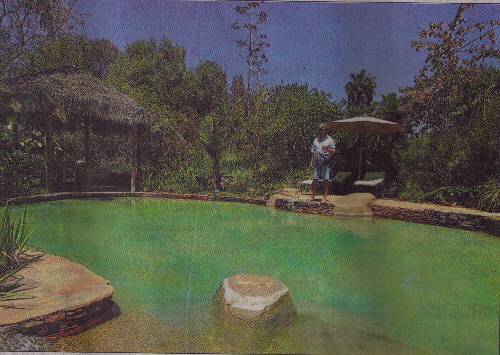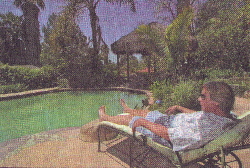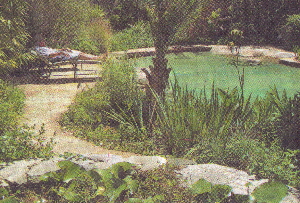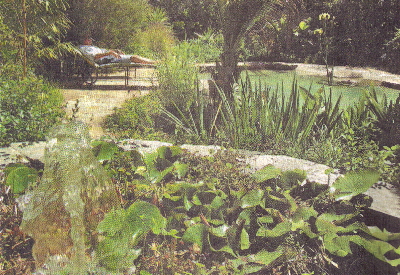![]()
 Clean and Natural
Clean and Natural
Vista designer's system uses plants to filter pool water
By: ALEXANDRA DELUCA - For the North County Times
Nestled in landscaper Bryan Morse's lush backyard in the East Vista countryside is a shimmering teal oasis: a crystal-clear, kidney-shaped swimming pool seemingly carved from its stone surroundings. A thatched roof gazebo overlooks the pool, which is bordered on two sides by tropical foliage and features partially submerged artificial boulders and a beach entry.
But what is most remarkable about this serene scene is what is noticeably absent: the noxious scent of chlorine that permeates most backyard swimming pools.
That's because there isn't any chlorine, or at least not enough for the human nose or even a chlorine test to detect: Morse's pool is a natural swimming pool, which relies primarily on aquatic plants to organically clean the water.
Austrian engineer Peter Petrich first originated the concept of natural swimming pools, also known in Europe as swim ponds or swimming ponds, more than 20 years ago. Petrich's model features a body of water separated into two sections: a swimming area and a regeneration zone in which various types of aquatic plants are grown. The plants in the regeneration zone, which is partly separated from the swimming area by a wall submerged a few inches below the water's surface, clean the water throughout the entire pool by absorbing bacteria and pollutants into their root systems. The plants also absorb nutrients from the water, thus inhibiting the growth of algae.
 Morse shows off another angle of his natural swimming pool. He converted it from a backyard pond four years ago.
Morse shows off another angle of his natural swimming pool. He converted it from a backyard pond four years ago.
Although natural swimming pools have become increasingly popular throughout western Europe over the past two decades in both private residences and public parks, Morse was not aware of them when he decided to convert his backyard pond into a natural swimming pool four years ago.
"When I first built this, I searched and searched for information on natural swimming pools and I couldn't find anything," said Morse, founder of Expanding Horizons, a landscaping company specializing in designing and building natural form landscapes such as water gardens. "What I was looking for was a way to have a natural pool and also have it be clean and pristine."
Morse wanted to combine the structure of a typical swimming pool with the natural filtration system of a pond and use as few chemicals as possible.
T he foreground shows the various plants that filter the pool water and keep it clean.
he foreground shows the various plants that filter the pool water and keep it clean.
"No chlorine is always much better," said Morse. "Chlorine causes all sorts of health problems. It's a toxin."
Unable to find any information about how to build a natural swimming pool, Morse said he "just went with what felt right" and built the pool as he would any other, with return lines, a main drain, skimmers and a pump. However, next to the pool he built two regeneration zones, which, unlike in European swim ponds, are completely separate from the swimming area.
A pump circulates the water between the regeneration zones and the swimming area through pipes hidden from view.
"You can do it in a lot of different ways -- the way they work is always the same," said Morse, who said he prefers regeneration zones to be a completely separate feature from the actual pool, and that he once built a natural pool in which the regeneration zone was 50 feet away from the pool and connected by a stream.
 Plants in one of the two ‘regeneration zones’ next to Bryan Morse’s natural swimming pool filter the pool water without using chlorine.
Plants in one of the two ‘regeneration zones’ next to Bryan Morse’s natural swimming pool filter the pool water without using chlorine.
The plants in Morse's regeneration zones are a mix of emergent, submergent and floating plants including water irises, star flowers, agapanthus, ornamental garlic, water mint, zebra grass, water hyacinths, Madagascar palm, water nasturtium and Cyperus papyrus.
"Variety is very good," said Morse, who said he is planning to add a third regeneration zone soon. "Biological diversity is always important."
Regular maintenance of plants in the regeneration zone is critical to maintaining the water quality in natural swimming pools: Morse regularly prunes dead leaves and trims the roots of the floating plants every two months so that they don't become saturated with toxins.
In the winter months, when many of the plants die or become dormant and are therefore less able to clean the water, Morse uses a Nature 2 system, a low-chlorine water sanitizing system. It's manufactured by Vista-based Zodiac Pool Care Inc. and uses a trace amount of chlorine -- less than the amount found in tap water -- to activate minerals inside the pump system that destroy bacteria and algae.
Although several low- or no-chlorine water sanitizing systems designed for traditional swimming pools such as the Nature 2 system have recently started appearing on the market in the U.S., natural swimming pools have not caught on in America the way they have in Europe. In fact, Expanding Horizons is one of only two companies in the U.S. that build natural swimming pools (the other is Kansas-based Total Habitat), and Morse has built only three of them, including his own.
Morse believes the scarcity of natural swimming pool manufacturers in the U.S. is only one reason why they haven't become popular here. "I think the European solution to a natural swimming pool will be a hard sell in the U.S.," said Morse. "That's not what American people think of as a swimming pool. It's a dirty pool."
Morse said he believes the only way natural swimming pools will catch on here is if someone comes up with an "American solution" that is cleaner than the traditional European model.
"It has to be crystal clear -- that makes it more appealing," said Morse, who said that more established natural swimming pool manufacturers in Europe are already starting to build "clean" natural swimming pools with completely separate regeneration zones, similar to the design of his hybrid pool.
However, Morse said he believes Americans' growing environmental consciousness will lead to more interest in natural swimming pools.
"Right now it's all about the green movement," said Morse, who said he gets at least two inquiries a day about natural swimming pools from people all across the country and around the world. "I think companies here will start offering natural swimming pools. There are a lot of companies that want to know how to do it right now. I could start a school."
Morse said he is happy to share his knowledge and serve as a "guinea pig" for America's burgeoning natural swimming pool industry. "I like to be ahead of the curve," said Morse.
For more information about natural swimming pools, contact Bryan Morse at (760) 505-7900 or
visit http://expandinghorizons.biz.
Call: (760) 505-7900 Email: bryan@expandinghorizons.biz
© 2018 Expanding Horizons is a part of the Omni Pragma® family All rights reserved.

